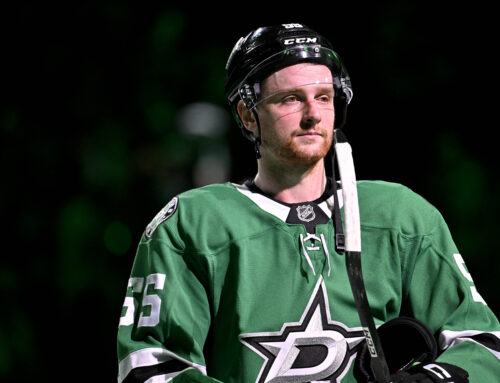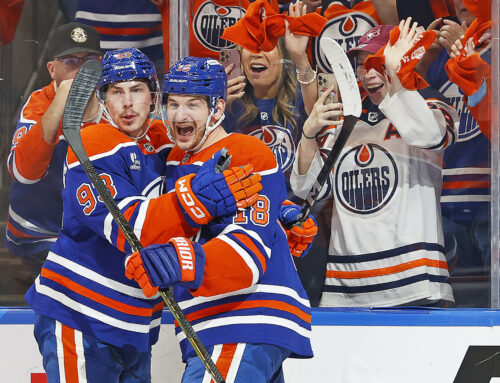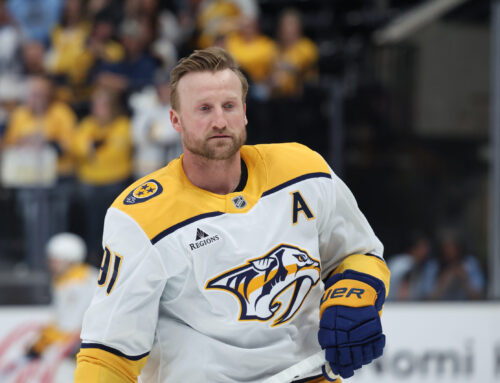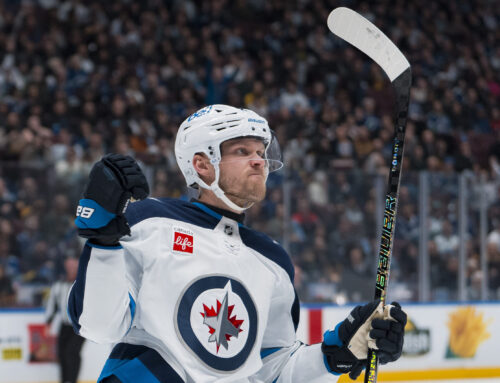
Seven slumping players in the Western Conference destined to rebound in 2016-17
On the Rebound
This list, as per usual, is largely a list of the players in the Western Conference who are most likely to rebound from an off year. Injuries are largely ignored unless the rebound is in their rate of production as opposed to their total production. For that reason Connor McDavid, even though a better second season would hardly be a rebound, and Alexander Edler will not appear on this list despite the expectation that their point totals will grow. There are other players, such as previous column favourite Colin Wilson, who will not be included because their off-years appear to be due more to a change in their usage as opposed to something that could change due to the helping hand of regression. Remember that shooting percentage is as much about the opportunities created as it is about pure luck. Therefore it is important to look at the types of chances a player is getting as well as whether their shooting percentage is low, this goes for on-ice shooting percentage as well. Shots from close in are more than twice as likely to go in than shots from the perimeter. Similar effects can be seen when the puck moves across the ice before a shot. Therefore looking at distance and scoring chance rate not just shot rate is more informative than just looking for a dip in shooting percentage.
Honourable Mentions:
Brian Campbell is not coming off of a bad year rather he is moving to a historically better offensive team. The better news for Campbell is that with the success that Duncan Keith and Niklas Hjalmarsson have had together a Campbell-Brent Seabrook pairing, playing more offensive minutes, looks likely. This would benefit Campbell significantly as it would get him away from the tougher minutes Florida needed him to play. Ryan Getzlaf did not actually have a bad year rather he just had a horrible year from a goal scoring perspective. As such his totals were not all that low, just the balance was off, namely a much higher assist to goal ratio than he usually has. Getzlaf has only scored on less than 10% of his shots twice in his career, one of those years being last year, thus even though his shot rate has fallen for two consecutive years expect another 20+ goals 70+ point season. Marian Hossa is a tough one as he is on the decline but last year appears to be more of a blip than a real slip. While his per game shot rate slipped a bit his per 60 shot and scoring chance rates were pretty similar to previous years. A huge rebound to the 50+ point player he used to be is unlikely but do not count on him continuing to shoot so poorly, thus between 40-45 points is a good bet. More if the Toews line gets a new, and working, third wheel. With the Kings losing Milan Lucic without a similar replacement look for Marian Gaborik to regain his regular spot in the top six. That should mean a minimum of 20 goals, 40 points and 60 games
In 2014/15 Vrbata played over half his even strength minutes alongside the Sedins, last year that slipped to just under 25%. It should not then be shocking that his points slipped from 63 points in 79 games to 27 points in 63 games. This was also reflected in his point per game dropping by half and his point per 60 rate dropping by nearly the same amount. Vrbata should see some improvement just from some more favourable usage in Arizona due to a few connected reasons. First, of the two middle-six veteran wingers, Shane Doan and Vrbata, Doan is much better suited to more of a defensive role. Last year Doan held his own in a defensive role with Brad Richardson as they limited goals against while actually having a positive relative corsi percentage. Those factors lead to the second and third factors, linemates and usage. Vrbata will likely get the majority of his minutes along side Dylan Strome on the second line. With Strome being a rookie he will likely get some protected minutes similar to those that Max Domi and Anthony Duclair received last year. Strome has the makings of a better offensive center than either Bo Horvat or Brandon Sutter and as such it should not be much of a stretch for Vrbata to hit 40 points this year.
There is a lot focus on Jordan Eberle for the Right Wing spot on the McDavid line but his hold on that spot should be not be assumed a lock. First he has a history of success alongside Ryan Nugent-Hopkins (RNH) as well and would make as much sense there as he does alongside McDavid. While Eberle’s success with RNH pale’s by comparison to his success to his success with McDavid the gap is much smaller than the gap between Yakupov’s success with McDavid and his numbers with anyone else on the team. The McDavid line with Eberle had better underlying numbers than the McDavid line with Yakupov, as such Eberle will likely start the season with McDavid. The Oilers need Yakupov to start producing like something approaching a former high draft pick, never mind a former first overall pick so it would behoove them to put him in a situation where he is primed to succeed. Yakupov has been bounced around the lineup many times over the last three years rarely playing 50% of his minutes with any one player over the course of a season. Despite that his underlying numbers are at worst constant and in many cases have somehow increased. That does not track with his falling shooting percentage. The Oilers need to figure out what they have in Yakupov so look for them to finally give him consistent, and more importantly talented, linemates.
Last year’s injury to Bryan Little hurt Mathieu Perreault harder than it did anyone else on the Jets. Over the last quarter of the season Perreault got three sevenths of his points playing with Marko Dano and Alex Burmistrov the quarter of the season before that he got his points playing with Nikolaj Ehlers and Joel Armia. That is a massive downgrade from playing with Mark Scheifele and one of Drew Stafford or Ehlers. Not surprisingly Perreault went from averaging 0.65 points per game over the first half of the season to 0.47 points per game in the second half. The takeaway from this information is that as long as Perreault is playing with serviceable talent he is good for more than 40 points per season, were he to ever play more than 70 games. Unless the Jets lose complete confidence in their third line center Perreault is safely in place as a winger on Scheifele’s line, likely with one of Ehlers or Patrik Laine on the other side. Bank on a return to his normal 0.65 points per game or 40 points over 60 games.
Staal did no better in New York than he was doing in Carolina. His numbers in Carolina though over the first half of the season were decent as he was scoring at just under a 0.6 points per game pace. During that time he was averaging more than 2.5 shots per game whereas after that he averaged less than a shot and a half per game. Even with his falling minutes it was not until the final quarter of the season that his time on ice fell to 16.5 minutes and his percentage of power play time to under 40%. The expectation in Minnesota is that Staal will play with Mikael Granlund and Zach Parise, likely in an offensive role. The Wild have Mikko Koivu and Erik Haula to handle the tough defensive minutes, which will leave a lot of offensive minutes for their top scoring line. The decline of Eric Staal was exaggerated by his usage in New York and the declaration of his death as a fantasy asset is greatly premature. He should be at worst a 40 point player but there is the real potential that he breaks 50 in a role tailor-made for him.
In the 95 games Wiercioch played from over the 2012/13 and 2013/14 seasons he averaged more points per 60 minutes at even strength than Shea Weber, PK Subban, Kevin Shattenkirk and Oliver Ekman-Larsson. In each of those seasons he also averaged more than five points per 60 minutes on the power play. He struggled offensively during the 2014/15 season and was stripped of all his power play time this past season. There are two noticeable changes in his underlying numbers; improved shot suppression numbers and he took less shots. Until last year the Senators always had the run of play with Wiercioch on the ice and still last year they fared better with him on the ice than off. The biggest change for Wiercioch seems to have been the change in coaches the Senators underwent from Paul MacLean to Dave Cameron as he had 16 shots in the 11 games he played under MacLean and 40 in the 41 games under Cameron. This is a diminished asset with all the tools to rebound in a big way if he is given the opportunity. If he is even given Beauchemin’s power play minutes 30 points is a possibility.
The biggest factor working in Larsson’s favour is that the Oilers paid a huge price to acquire him and will no doubt want that trade to look as positive as possible. Conversely, the way in which Larsson can best help the Oilers is in his ability to play heavy defensive minutes and not get torn to shreds. Part of that success last year was no doubt due to the stellar play of Cory Schneider but there is no comparable defenseman on the Oilers in their own end. The nature of Larsson’s position on the Oilers will manifest itself in heavy defensive minutes at even strength as well as a big load on the penalty kill but he will probably also see more than a minute per game on the power play for the first time since the 2011/12 season. It will also help that the Oilers 2.07 goals per 60 minutes at even strength is a huge step up from the 1.72 goals the Devils score at even strength. To put that in perspective that is the same gap in scoring between the best offensive team (Dallas) and the 15th offensive team (Nashville). That is an extra three points for Larsson without any power play minutes. It will not take much more for Larsson to hit 30 points this season with the expected power play usage. In short look for the shift in Larsson’s usage to make the difference in his rebounding from a bad offensive year.
This pick is a little unorthodox but warranted. Talbot’s save percentage has declined from 94.1% in 2013/14 to 91.7% last year. Last year is somewhat deceiving though as from December through March he had three months with a save percentage over 93%. The acquisition of Adam Larsson has the potential to make a big difference for Talbot. The only defenseman on the Oilers who had a similar effect on the number of shots allowed was Oscar Klefbom. The difference between Klefbom and Larsson is that Klefbom had a relative zone start rate of -3.99 while Larsson’s was -24.81. That means that Larsson was basically always starting in his own zone, he only started 20.71% of his shifts in the offensive zone. Larsson had the 30th best shots against per 60 relative amongst defensemen who played over 300 minutes while starting the highest percentage of his shifts in his own end. If it is not yet clear just how good Larsson is defensively, the Devils allowed a full goal more per 60 minutes when he was off the ice than when he was on. While Andy Greene had something to do with it, Larsson fared better when they were apart than Greene did and still played tougher minutes. Larsson is not sexy but he, not the goal post, is Talbot’s best friend in Edmonton. Look for a save percentage over 92% this year as Talbot finally has some help.
Statistics in the column this week were drawn from the Player Profiles and reports on Dobberhockey.com, Corsica.hockey, hockey-reference.com and stats.hockeyanalysis.com





 CHI
CHI SEA
SEA FLA
FLA DAL
DAL WPG
WPG CBJ
CBJ L.A
L.A BUF
BUF S.J
S.J N.J
N.J
